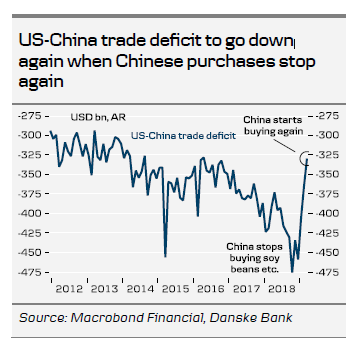China today retaliated against Trump's tariffs. On the surface it looks like a measured response but China is also likely to stop purchases of US agricultural goods and other products.
However, we believe China will retaliate in a moderate way in order not to provoke a further escalation. We do not expect China to sell US treasuries.
We continue to see the risk that things will have to get worse before they get better and that it will take financial stress and declines in the stock markets to get Trump back to the negotiation path.
So the response from China to Trump's tariff increase came today with the announcement that the tariff rate on US goods worth USD60bn will be raised to up to 25% on 1 June . The USD60bn figure is the same as when Trump launched the initial 10% tariff on USD200bn of Chinese goods. So in that sense the response is symmetrical.
However, China is also likely to take other measures. We would expect China again to halt purchases of a range of agricultural goods, as was the case last year when the trade war was ongoing. In that sense, China is choosing a quota over a tariff response, which last year proved quite efficient. At least, exports to China suffered more than Chinese exports to the US and the US-China deficit increased even more. This year it came down again after China resumed the purchases, but that will stop now.
The editor of Global Times Hu Xijin tweeted today that 'China may stop purchasing US agricultural products and energy, reduce Boeing (NYSE:BA) orders and restrict US service trade with China'. He added that 'Many Chinese scholars are discussing the possibility of dumping US Treasuries and how to do it specifically.'
While we could see a reduction in Boeing orders and restrictions of service trade, we have a hard time seeing Chinese selling of US Treasuries. It would simply not be a wise choice as it could easily backfire and provoke a big reaction in the US. It could be that the purchases would slow down a bit but outright selling is not likely in our view.
China's top negotiator Vice Premier Liu He said on Friday: 'If the US raises tariffs, we will react. Of course we hope that the US maintains restraint, and China will also restrain itself, and not escalate it indefinitely' . This indicates China will be careful not to overreact but will give a measured response. At the same time, it will not sit back and take the hits without reacting.
The Chinese response was to be expected and should not come as a big surprise to markets. Nevertheless, they reacted negatively. It suggests that as we have seen before, markets tend to react to actual announcements on trade sanctions even when they are well flagged in advance.
Trump tweeted today that China had a great deal and backed out. On the Chinese side the view is there was no acceptable deal and that China will not 'back down on matters of principle'. It is difficult to see how the differences can be ironed out in the short term, and we see a risk that it will take financial stress to force the two sides back to the negotiating table to find a solution.

